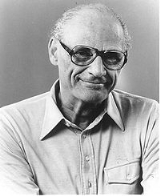
and essayist. He was a prominent figure in American theatre
, writing drama
s that include plays such as All My Sons
(1947), Death of a Salesman
(1949), The Crucible
(1953), and A View from the Bridge
(one-act, 1955; revised two-act, 1956).
Miller was often in the public eye, particularly during the late 1940s, 1950s and early 1960s, a period during which he testified before the House Un-American Activities Committee
, received the Pulitzer Prize for Drama
and the Prince of Asturias Award, and was married to Marilyn Monroe
.
Arthur Asher Miller was born on October 17, 1915, in Harlem
, New York City
, the second of three children of Isidore and Augusta Miller, Polish-Jewish immigrants.
I have made more friends for American culture than the State Department. Certainly I have made fewer enemies, but that isn't very difficult.![]()
I know that my works are a credit to this nation and I dare say they will endure longer than the McCarran Internal Security Act|McCarran Act.![]()
The structure of a play is always the story of how the birds came home to roost.![]()
The closer a man approaches tragedy the more intense is his concentration of emotion upon the fixed point of his commitment, which is to say the closer he approaches what in life we call fanaticism.![]()
By whatever means it is accomplished, the prime business of a play is to arouse the passions of its audience so that by the route of passion may be opened up new relationships between a man and men, and between men and Man. Drama is akin to the other inventions of man in that it ought to help us to know more, and not merely to spend our feelings.![]()
A play is made by sensing how the forces in life simulate ignorance — you set free the concealed irony, the deadly joke. ![]()
A good newspaper, I suppose, is a nation talking to itself.![]()
The best of our theater is standing on tiptoe, striving to see over the shoulders of father and mother. The worst is exploiting and wallowing in the self-pity of adolescence and obsessive keyhole sexuality. The way out, as the poet says, is always through.![]()

